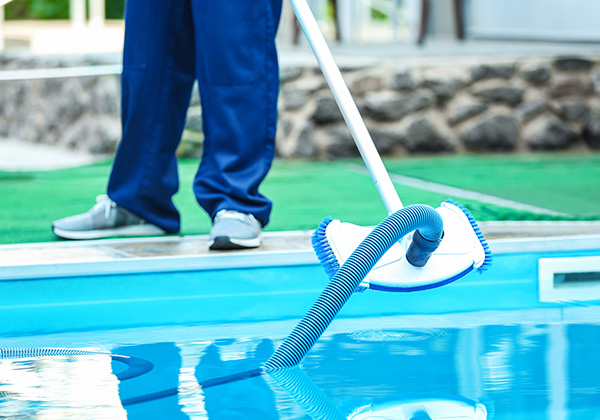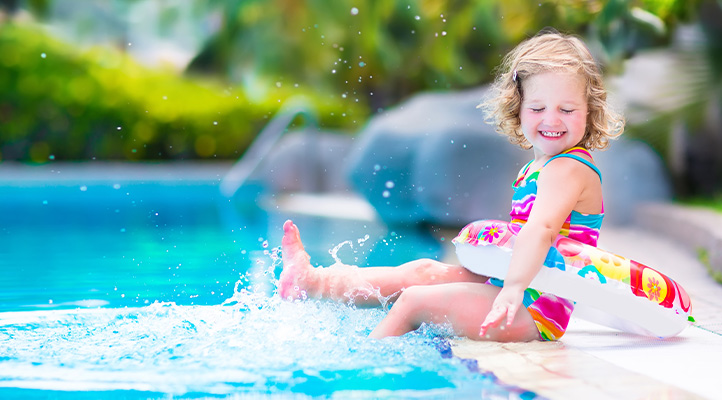What is swimming pool maintenance?
As a swimming pool owner in Dallas, if you want a pool that sparkles like a splash of water in the sunlight, you should have a proper swimming pool maintenance plan in place.
In this blog, we will explore three key areas of pool maintenance and explain why they are so important.
Water Circulation
Without adequate circulation and water movement, your pool can quickly become a happy hunting ground for bacteria and algae. After all, if anything you add to the pool water is not circulated, your pool’s chlorine levels will quickly start depleting, and the pH levels and total alkalinity levels will rise.
Chlorine levels, pH levels, and total alkalinity levels are the three most important chemical factors you need to manage in your pool. If they get out of whack, that can cause a spiral reaction, which is never pretty.

If you do not winterize your pool, run your equipment for at least six hours during the off-season (when it is too cold to swim) and between 8 and 10 hours during the summer months. Make it a point to cycle all the pool water at least once during the swimming season. Otherwise, you risk less than adequate water circulation and all kinds of chemistry issues in your pool.
Filtration
Filtering your pool is one of the most important things you need to do to remove foreign particles from the pool water and keep your pool sparkly clean.
There are three main types of filtration systems: sand filters, Diatomaceous Earth (D.E.) filters, and cartridge filters. Each of them has its own maintenance needs, but don’t worry – the process is pretty simple and straightforward.
For sand filters, it is as simple as backwashing the filter. Adjust your backwash valve to the backwashing position or adjust your multi-port valve appropriately. Let the water run for 90 seconds or until the water coming out of the backwash is clean and clear. If the pressure exceeds 5 PSI greater than normal operating pressure, backwash your filter. Note that you cannot over-backwash your filter. So no matter what the filter pressure reading, you can backwash your filter every week.
For DE filters, the process can be slightly more time-consuming. Inside your filter dome, you have filter grids. These need to be removed and hosed down with a high-pressure water hose. If you have a pressure washer, you can also use a good degreasing agent and mix it with the water. Use a very mild solution of water and cleaner in a 4:1 ratio. You do not need to get a D.E. filter cleaner from a pool supply store; you likely have something that will work just fine under your kitchen sink right now. You can also use water and mild muriatic acid in a 3:1 ratio, as well as your dishwashing detergent. All you need to do is ensure that you thoroughly rinse the grids, so there is no detergent residue after you have completed the job.
Finally, you have cartridge filters. For proper swimming pool maintenance, if you have this type of filter, the process is similar to cleaning a D.E. filter. Remove the cartridge(s) from the canister and thoroughly hose it down. If you have a high-pressure water hose, you can also use a mild muriatic acid mix or standard dishwashing detergent. Heavily spray the cartridge until it is visibly clean and reassemble the filter unit. Make sure there are no leaks in the filter head o-ring when the filter is running.
Water Chemistry
Balancing your pool’s chemistry is perhaps the most crucial aspect of your pool maintenance plan. If any area of your pool chemistry is not right, it can cause a chain reaction that could worsen the situation and require extensive (and expensive) repairs in the future.
The three main areas of water chemistry to focus on are chlorine levels, Total Alkalinity levels, and pH levels.
- Your pool’s chlorine levels should be between 1 and 3 ppm (parts per million) during the summer months and on the lower ends of that range during the winter season.
- Your pool’s total alkalinity levels should be in the range of 110 to 130 ppm. Your pool’s total alkalinity levels essentially act as a buffer for the pH to prevent wild and extreme swings in the amount or strength of hydrogen in your pool water.
- Your pools’ pH levels should be between 7.4 and 7.8. Any higher than 7.8 or any than lower than 7.4, and your pool water can start to irritate your skin every time you take a dip in your pool. It can also cause calcium buildup in your piping and along the waterline, which can, in turn, prematurely corrode your expensive pool equipment.
Test your pool’s water chemistry every week, and call a professional swimming pool service company if necessary.
Conclusion
These three areas of pool maintenance are not ALL that pool maintenance is about. There is more to it. However, these are the three most important areas that can help you keep your pool sparkling clean. So, take these into special consideration and leave your friends, family, and neighbors speechless when they see that stunningly beautiful oasis in your Dallas home.
Looking for Professional Pool Maintenance Services in Dallas, TX?
At Quality Pool Service, we can help you with all your pool cleaning needs. We are a family-owned and operated business rendering reliable and affordable pool-related services to homeowners in and around Dallas, Texas.
Call us at 214-428-6221 or contact us online to get a free quote if you want to clean, repair, or renovate your swimming pool, so you spend less time taking care and more time enjoying your pool.
Spend Less Time Taking Care of Your Pool
And Spend More Time Enjoying It!
Call Quality Pool Service, Inc. in Dallas, TX For a Free Quote Today
Spend Less Time Taking Care of Your Pool
And Spend More Time Enjoying It!
Call Quality Pool Service, Inc. in Dallas, TX For a Free Quote Today


10610 Metric Dr #155
Dallas, Texas 75243
214-428-6221
Email Us
Monday-Friday 7am to 4pm
Regulated by The Texas Department of Licensing and Regulation
P.O. Box 12157
Austin, Texas 78711
1-800-803-9202, 512-463-6599
Website: www.tdlr.texas.gov/complaints
